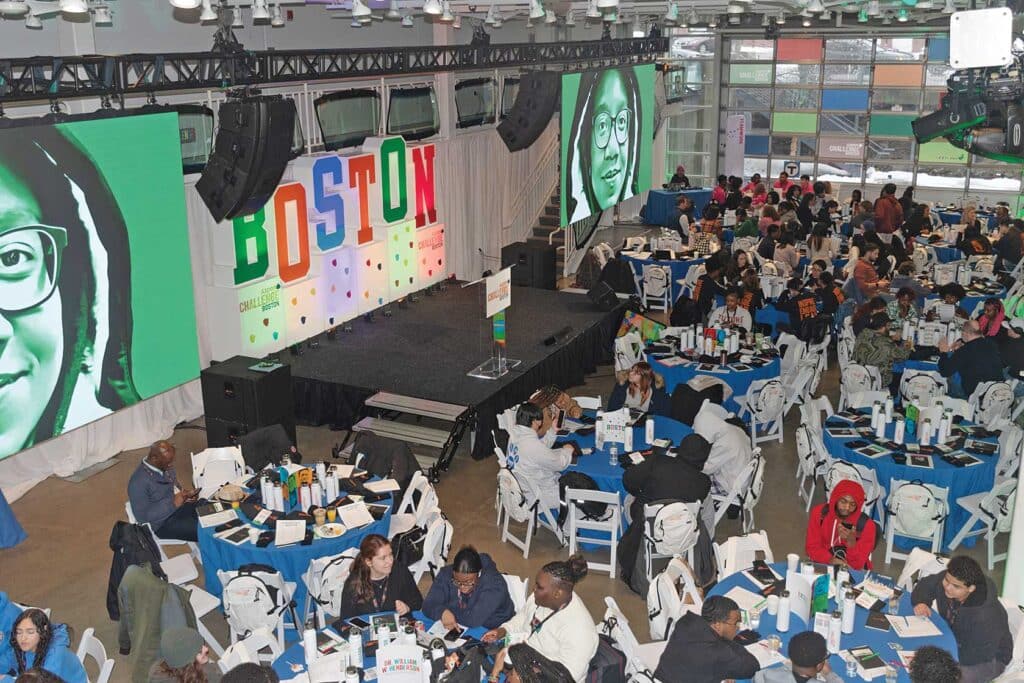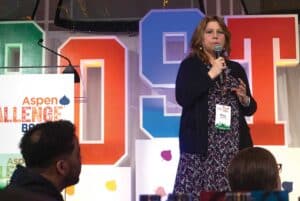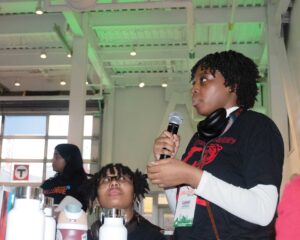
Under bright, colorful lights, to the beat of music, high schoolers across Boston gathered to kick off a new opportunity to make their voices heard.
The launch event, held Feb. 13 at the Artists for Humanity building in South Boston, marked the start of a 10-week process in which student teams from 20 Boston high schools will have the chance to develop their own solutions to one of five major challenges facing the city today.
Brian Hodge, a junior at TechBoston Academy in Dorchester, said he sees the challenge as a new set of resources to make the changes he and other high schoolers like him want to see better their communities.
“[The Aspen Challenge] gives us the bass in our voice to actually make that change happen and to push forward and to move our community forward,” he said.
Throughout the course of the program, a team from each of the schools will choose one of the challenges — aimed at tackling a list of issues including gun violence, access to green space, affordable housing, post-secondary pathways for young people, and the link between substance use and social media — putting together and implementing a solution in their communities.
The Aspen Challenge is run by the Aspen Institute, a Washington, D.C.-based nonprofit that hosts events and conferences around global issues. Each year a new city is selected to participate in the challenge.

Boston Public Schools Superintendent Mary Skipper delivers remarks at the launch of the Aspen Challenge. Skipper said she thinks the event will be a “life-changing experience” for students. “Sometimes you don’t realize you’re in a life-changing experience,” she said. “I want them to soak it all in.” PHOTO: AVERY BLEICHFELD/BAY STATE BANNER
Mary Skipper, superintendent of Boston Public Schools, said she sees the program as a “life-changing experience” for students — one she hopes they will use to help discover what they can do and how they can help solve challenges.
“When you see a challenge, you can step back from it, or you can step to it, and leaders step to challenges,” Skipper said. “Every one of those students has taken that first step in being here today.”
Cities participate in a two-year, overlapping sequence, so when the selected teams from Boston attend the Aspen Ideas Festival in June, a week-long program hosted by the Aspen Institute in Colorado, they’ll be going up against one team from San Diego, which had its first year of the program in 2024 (next year one Boston team will go, in addition to whichever city is selected next).
Brett Howley, Associate Director at the Aspen Challengez, said she thinks it’s important to give high school students the chance to have a platform. Often, she said, she’s heard participants come up and say, “No one’s ever asked us before.”
Each of the challenges was posed to the students by an expert in the field, with a specific directive — things like reimagining an empty space into green space or developing an intergenerational initiative to increase access for young people to post-secondary resources and opportunities. That model, Howley said, is key to helping them get started as they aim to tackle enormous issues.
“These topics are big and they’re daunting, and sometimes it’s hard to wrap your head around them,” she said. “You do need to kind of give a little bit of direction for them to start.”
But even with a slightly narrower prompt, once the students get going, the Aspen Challenge team said they hope the impact will be big too.
Each high school team will not only have to plan a solution in the next 10 weeks but put it into practice and get a sense of how it fares in the world so that when they come back to the program’s solutions showcase in April, they can present outcomes.
That timeline is condensed — Howley said that the program doesn’t “give them all the time in the world to change the world” — but students said they felt up to the challenge.

A TechBoston Academy student asks a question during the launch of the Aspen Challenge at the Artists for Humanity space in South Boston, Feb. 12. PHOTO: AVERY BLEICHFELD/BAY STATE BANNER
“I feel like my group will be able to come together and easily find these solutions,” said Sinai Phillips-Thompson, a junior at TechBoston Academy. “And the 10 weeks are just to get the foot in the door. Nothing is saying that after these 10 weeks, we can’t just keep trying to make our solution be available.”
Hodge said the timeline felt appropriate for the real-world issues they’re challenged to tackle.
“I feel like it’s real life,” he said. “Time doesn’t stop for anybody, so you’re going to have to crunch, you’re going to have to make a solution. I feel like it prepares us for that.”
Its organizers said the Aspen Challenge is a program that is unique by putting young people in the driver’s seat of solutions.
During remarks welcoming students to the kick-off, Katie Fitzgerald, managing director of the Aspen Challenge, said that they were gathered because we need the voice of the next generation.
“We need your voices. We need your creativity. We need your leadership,” Fitzgerald said to students. “We’re talking about some of the most serious issues that we face in society. You have the answers, and in the next 10 weeks, you are going to show us how to do things that we as adults, we as a society, have not figured out how to do yet.”
Howley said it’s important for student voices to be heard.
“This is an untapped resource that we have — our young people in the world,” Howley said. “We think they’re the leaders of tomorrow. They really can be the leaders today, and we need them.”
Even the challenge issues stemmed from student input. Throughout the fall, the Aspen Challenge team held focus groups with Boston high school students with the open-ended question of what the most pressing issues were that they saw in the city.

Boston Public Schools students gather at the Artists for Humanity space in South Boston, Feb. 12, during the launch of the Aspen Challenge. PHOTO: AVERY BLEICHFELD/BAY STATE BANNER
From those gatherings, the Challenge team took what students said they felt, distilled the responses to five solutions and tracked down experts to issue the specific challenge prompts. Largely, they tried to keep the experts local, Howley said.
For example, Brandy Brooks, who issued the affordable housing challenge, is executive director at Higher Ground, a Roxbury-based nonprofit focused on housing and education, and the challenge focused on green space was issued by Gretchen Rabinkin, executive director of Boston Society of Landscape Architects.
“I think they’re right on the mark with what they’ve picked,” said Skipper, who is looking forward to seeing which issues students gravitate towards.
They are also issues that can impact students’ day-to-day lives.
“These are the things our students and their families have experienced, or they see,” Skipper said. “I think it’s wonderful that they’ve identified them as the challenges that they want to put their effort, their time, their thinking into.”
Students also said they feel close to and interact with the issues regularly.
Phillips-Thompson said she was interested in the gun violence and housing issues — both of which she said she sees as needing attention in her community or in the city at large.
Hodge, too, pointed to housing as one that resonates with him.
“You go down [Massachusetts Avenue], [Dorchester Avenue], and you see these rows and lines of homeless people,” Hodge said. “It’s disheartening, it’s hard.”
Some of the issues also impact students directly. Manuel Oliver, co-founder of Change the Ref, who posed the challenge for students to develop a campaign tackling gun violence, pointed to lockdown drills that students regularly participate in to prepare for shooter situations.
“They have to go to school and learn how to protect themselves in an active shooter situation and they are sick of that,” Oliver said. “It’s not fair that they need to train how to survive.”
While the Aspen Challenge may be specifically centering the perspectives of high schoolers in a way that is unique for many of them, Skipper said that she views Boston, especially under the administration of Mayor Michelle Wu, as a place where students are more often brought into the conversation.
She said that highlighting student voices in this way elevates their agency in a way the city wants.
“Our mayor is so about our students being solutions and coming to the table and being part, with their voice, of the real issues our city faces,” she said. “This just elevates that in so many ways.”
Skipper said specifically, she’s interested in seeing if student solutions around post-secondary education can help inform how the district approaches early college and career programming in Boston’s public high schools. And she said that she imagines Wu might be interested in hearing what students come up with around things like access to green space.
Students from the district, too, described a unique environment in the city.
“I feel like, living in Boston, I have had so many opportunities to try to put my input or get people thinking about my ideas so I can make things happen,” Phillips-Thompson said.






